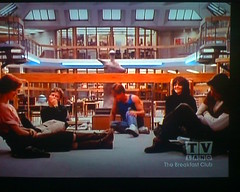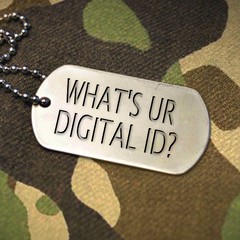As teens 20 years ago, trying to forge an identity with social pressures was challenging enough. It was time when one could perhaps be themselves, without the eyes of peers constantly "watching". Today with social media, do teens have more or less freedom to be themselves? Is the presence of the "ever-present" social media changing the way kids form their identity? Or is there a greater challenge in trying to create that online identity and be true to their offline identity?
In "The Breakfast Club" we see the effects of stereotyping and bullying, which seem to be somewhat overcome by an afternoon of detention which opened the social boundaries that separated the teens. In today's terms how have the roles changed? In the on-line world, what are the new roles? Could they be the: "Citizens", "Trolls", "Victims", "Hackers", "Users", "Creators", "Tweeters", and "Curators" ... (I'm sure there are more, these are just a few I could think of.) But how are these roles changing the formation of this identity? Are the Pintrest users the new "Princesses", "Google+" users the new "Brains" and the "Trolls" the "Criminals"? Have things changed that much in 25 years? Are students still categorized by their peer group and how they socially interact. Is it just the location for social interaction the part that has changed?
A few years ago, I had to intervene with a couple cases of harassment via Facebook with a middle years student. The solution that was decided, was that the student being harassed should "take a break from social media", for their own emotional protection. It was a challenging situation to navigate, because as was pointed out in our discussion with @bonstewart Tuesday night, why does the victim always have to stop socializing via social media? Why not the bully? Seeing the student suffering from the hurtful comments and not really getting a break from it was heartbreaking. What was more challenging, was trying to get the cooperation from the parents of all the students involved to intervene and admit that something had to be done (and not just the parents of the victim). My situation was only a small fraction of the insidious harassment as evident in the Amanda Todd case (CBC Fifth Estate story, "The Sextortion of Amanda Todd"), but nonetheless, one can see how quickly social media can turn ugly, even at a middle years level. It makes you wonder, where is the on-line detention room when you need it?
Going back to "The Breakfast Club", how can we look for spaces (outside of detention) where kids can socialize in this world and really get to know each other? Or is this even necessary?? Should we keep these on-line spaces impersonal and controlled, particularly with younger on-line users?? Or should we look the Internet as a place that will provide a space where social boundaries can be crossed, sort of like in "The Breakfast Club"?
There are so many questions still left unanswered, that I will need to muse on further...





I love how you connected last class with the movie, The Breakfast Club - which, by the way, is one of my ALL-TIME favourite movies! You pose a lot of good questions and thoughts. Yes, we would like students to enjoy themselves while posting and commenting online, but they need to be careful so as to protect their identities and continue to make careful decisions.
ReplyDeleteBy the way, many teachers use Pinterest to gain ideas about their classroom management and lesson planning - I am one of those teachers! So, does this make me a Brain?? :-)
Excellent post! I enjoyed reading your post and reflecting about the comparisons with social identity and cliques. I have never made that connection before and I thought it was very interesting. You asked some very important questions! I think now more than ever it is important for teachers to discuss with their students about their digital footprint and how they need to be careful of protecting their identities online!
ReplyDelete